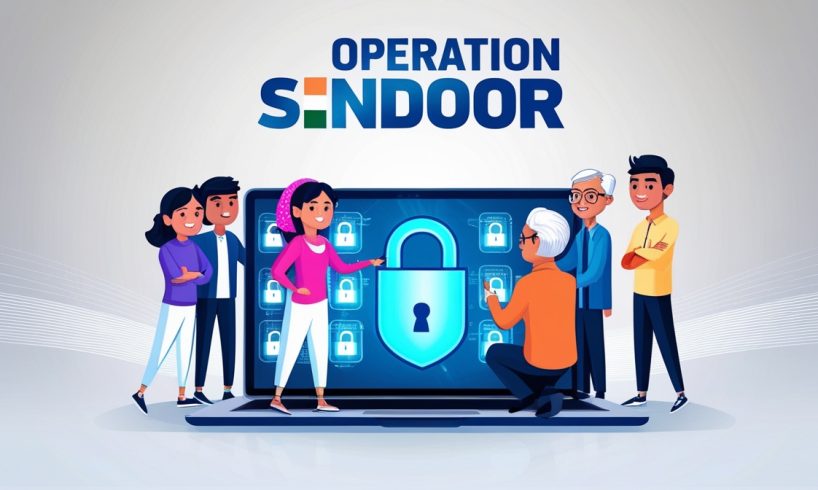
New Delhi, May 2025 – In a decisive move to counter the rising threats of cybercrime and digital misinformation, the Ministry of Electronics and Information Technology (MeitY) has launched Operation Sindoor, a nationwide campaign focused on promoting digital safety and responsible internet usage. The initiative aims to educate citizens about online risks and arm them with actionable guidance to protect themselves in the rapidly evolving digital landscape.
Background of Operation Sindoor
Operation Sindoor is part of a broader strategy by the Indian government to combat cyber threats, scams, and online exploitation that have seen a sharp rise in recent years. Named after the traditional symbol of security and sanctity, “Sindoor,” the campaign metaphorically reinforces the idea of protecting one’s digital identity with vigilance and awareness.
The operation also aligns with the Digital India mission, reinforcing the importance of cyber hygiene in an increasingly connected society.
Key Objectives of Operation Sindoor
- Spread awareness about digital threats, such as phishing, online fraud, identity theft, and cyberbullying.
- Equip citizens with practical guidelines on using the internet safely.
- Encourage responsible behavior online, including social media etiquette and data privacy.
- Collaborate with state governments, educational institutions, and industry players to implement widespread cyber awareness programs.
The IT Ministry’s Dos and Don’ts for Internet Users
As part of the campaign, MeitY has released a comprehensive list of Dos and Don’ts to guide citizens in their daily online interactions. These guidelines are aimed at minimizing vulnerabilities and encouraging best practices.
✅ Dos:
- Use strong, unique passwords and change them regularly.
- Enable two-factor authentication (2FA) for all critical accounts.
- Keep software, apps, and antivirus tools updated.
- Verify links and email senders before clicking on attachments or sharing sensitive information.
- Report suspicious messages, websites, or transactions to local cybercrime units or via the Cyber Crime Portal (cybercrime.gov.in).
- Back up important data regularly to secure offline or cloud storage.
- Use secure internet connections, especially when making financial transactions.
- Be respectful and responsible on social media platforms.
❌ Don’ts:
- ❌ Don’t share personal or financial details with unverified sources.
- ❌ Don’t click on unknown or suspicious links, especially those promising quick rewards or job offers.
- ❌ Don’t download apps or files from unauthorized sources.
- ❌ Don’t ignore browser warnings or system alerts about unsafe sites.
- ❌ Don’t post or forward misleading content, fake news, or hate speech.
- ❌ Don’t leave your devices unattended or unlocked in public places.
- ❌ Don’t use the same password across multiple accounts.
Nationwide Impact and Next Steps
To amplify the impact of Operation Sindoor, the ministry is collaborating with cybersecurity experts, influencers, and media platforms to spread awareness. Schools and colleges will see digital literacy workshops, while rural outreach programs will ensure that even non-tech-savvy users are informed and empowered.
Helpline numbers, online grievance portals, and public information campaigns will support citizens in reporting incidents and learning more about online safety.
As India becomes increasingly digital, Operation Sindoor is a timely and necessary initiative. By following the IT Ministry’s guidelines and staying vigilant, users can enjoy the benefits of the internet while safeguarding themselves from digital harm.
The government urges every citizen to not just be a user of the internet, but a conscious and secure digital participant.

I am a person who is positive about every aspect of life.I have always been an achiever be it academics or professional life. I believe in success through hard work & dedication.
Technology Blogger at TechnoSecrets.com






